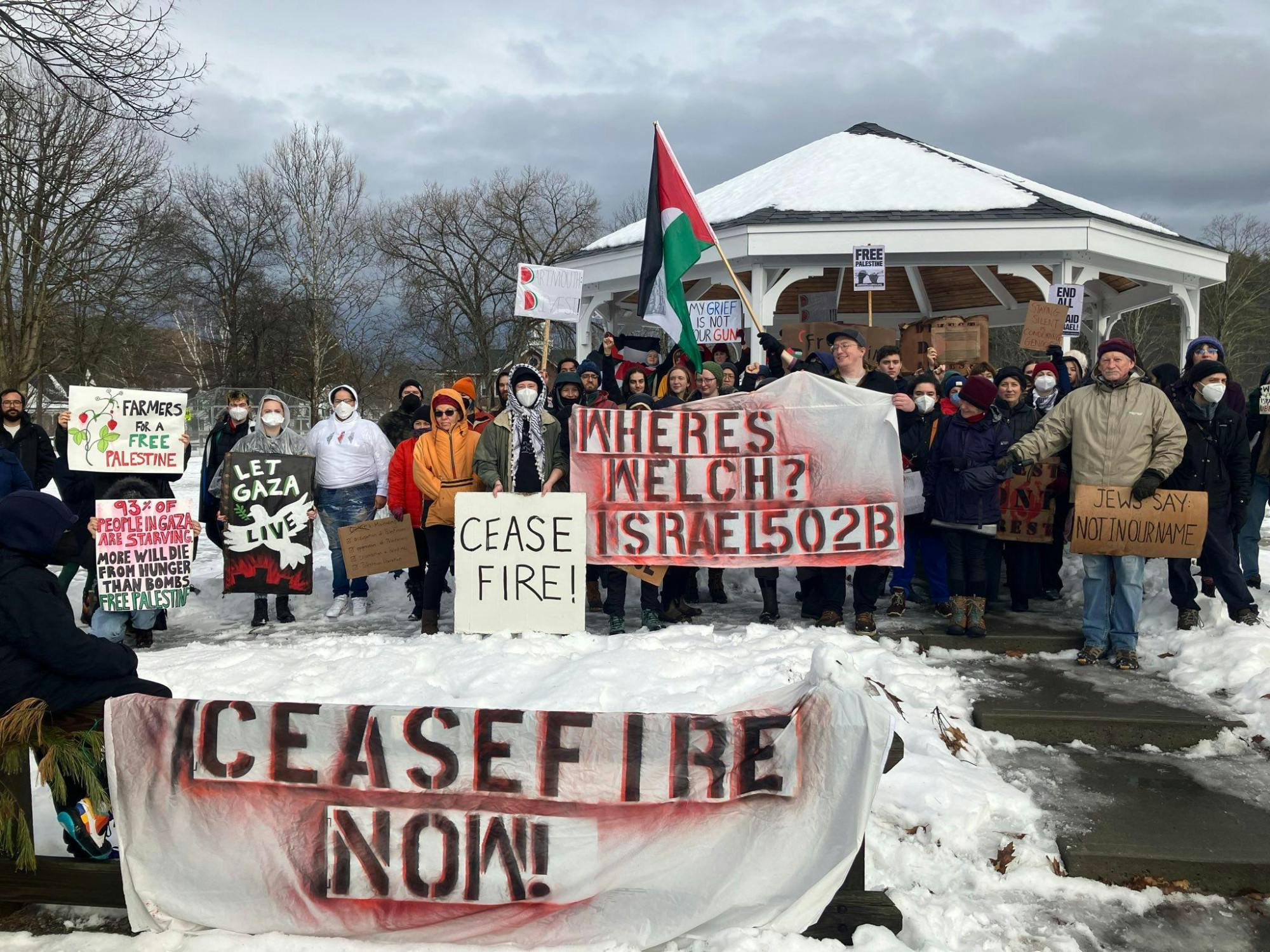On Jan. 13, Upper Valley for Palestine organized a protest in Hanover to call for a ceasefire in Gaza in solidarity with the national march that occurred the same day in Washington, D.C. Over 150 members of the Dartmouth and Upper Valley community gathered on the Green and marched across the Ledyard Bridge into Norwich in support of Boycott, Divestment and Sanctions, a Palestinian-led movement that aims to put economic pressure on Israel to withdraw from occupied Palestinian territories.
According to its website, Upper Valley for Palestine is a coalition of organizations in support of a “free Palestine,” and includes Jewish Voice for Peace VT/NH, the Dartmouth Palestine Solidarity Coalition, Sunrise Dartmouth and the Upper Valley Democratic Socialists of America. Protestors called on congressional representatives from New Hampshire and Vermont to support a ceasefire and discontinue U.S. military aid to Israel, according to a flier handed out at the protest.
In addition to calls for a ceasefire, the protestors demanded that the College “divest its endowment from Israeli apartheid,” according to the flier. Jewish Voice for Peace VT/NH founder Liz Blum said she opposed the arrest of student protesters Roan V. Wade ’25 and Kevin Engel ’27 in October and expressed concern over the College’s treatment of pro-Palestinian sentiment.
“With what is going on … it’s unbelievable that President [Beilock] will not drop the ridiculous charges against Kevin and Roan,” Blum said.
Calvin George ’24, who attended the march, said he found the College’s response to the student protestors “unconscionable.”
“First and foremost, I’d like to see the charges against Kevin and Roan dropped,” George said.
He added that as a Dartmouth student, he wants to see more transparency regarding the endowment.
“We’re also talking about a commitment and visibility in the endowment, so we can know that our tuition that gets put into this endowment is being spent ethically in a way that we’re comfortable with,” George said. “I’d like to see a public commitment to justice, essentially.”
Blum added that the war in Gaza has exacerbated environmental issues, which is a concern for many of Upper Valley for Palestine’s member organizations.
“We’re fighting to reduce emissions, and war is one of the biggest contributors to climate change,” Blum said. “We see all these issues as interconnected.”
According to Blum, there was a “wonderful” outpouring of support at the march.
“People kept coming … even though it was pouring rain,” she said. “People just had so much spirit, and I was amazed at the huge crowds in Norwich.”
Dartmouth PSC president Ramsey Alsheikh ’26 said that as a Palestinian-American, he felt touched by the support of the protestors.
“To see all these people coming up to stand in solidarity with the people of Gaza, it was the first time in a long time since I felt heard on this campus or treated as a human being,” Alsheikh said. “I think that what we did on Saturday was a good first step in the direction of getting our humanity back on this campus.”
Alsheikh added that he has felt a loss of identity as a Palestinian student on campus.
“We’re seen more as a number of casualties to be maximized or minimized or managed rather than as a human community of culture and history,” Alsheikh said. “When it comes to having an identity of a Palestinian, it’s not in any way, shape or form given the same level of respect or human treatment as any other identity is.”
Blum said that the Jewish Voice for Peace VT/NH has grown from 40 to 400 members since October. She attributed this rapid growth to an increase in self-reflection on Jewish identity.
“I think people in the United States are starting to think about what it means to be a Jew now,” Blum said. “We feel that, as Jews, we believe in humanity and human rights and dignity for all people.”
George said that the attendance at the march represented community-wide dissatisfaction with the status quo.
“This march represents to me that not only are Dartmouth students not happy with [the status quo], but the community as a whole is not happy with [it],” George said. “I feel like it reinforced the idea that we’re not alone, and that there are a lot of people around that are with us.”
Upper Valley for Palestine has scheduled Palestinian poetry events as well as other marches, rallies and protests throughout Vermont and New Hampshire, according to Blum. She added that the group conducts weekly vigils in remembrance of all the lives that were lost in the conflict and are determined to strengthen participation in the Upper Valley.
“We’re not going to stop,” Blum said. “Students are outraged, and the more that students are punished and arrested, it just reinforces their conviction.”
George said that it was encouraging to see members of the Upper Valley support the national cause.
“I feel like in terms of activism, there’s a lot of apathy in general, or people just don’t have the bandwidth to go to classes, do other extracurriculars and go to marches and protests,” George said. “It was really encouraging to see how much support there actually was in the Upper Valley because sometimes, you don’t feel it.”
Alsheikh said he sees the march as an important step for the local community to connect to each other and have important conversations.
“Interacting with people on a smaller scale and making an impact where you live and where you go to school is, in my opinion, just as important as getting on the national stage,” Alsheikh said. “When you’re able to create these conversations and experiences where you already are, you potentially change minds.”
Ramsey Alsheikh ’26 is an Opinion staff columnist for The Dartmouth.




